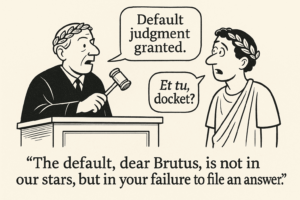 “As to the October 6 answer being filed by Liang, a non-attorney, this Court has explained ‘a non-attorney’s answer on behalf of a corporation is a “curable defect” and does not make the answer ineffective. Although the answer is defective, it is sufficient to prevent the trial court from granting a no-answer default judgment against the corporate defendant.” Deal Finder LLC v. Cruz, 05-24-00311-CV (May 9, 2025).
“As to the October 6 answer being filed by Liang, a non-attorney, this Court has explained ‘a non-attorney’s answer on behalf of a corporation is a “curable defect” and does not make the answer ineffective. Although the answer is defective, it is sufficient to prevent the trial court from granting a no-answer default judgment against the corporate defendant.” Deal Finder LLC v. Cruz, 05-24-00311-CV (May 9, 2025).
Category Archives: Default Judgment
“The difference between 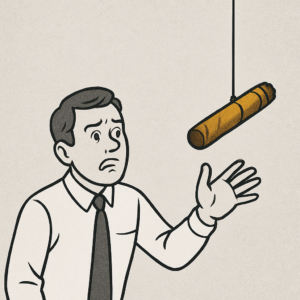 aming Carlos Whitfield and Donna M. Williams as WWW’s registered agent cannot be characterized as ‘minor.’ The critical distinction, however, is that an incorrectly named agent was not served pursuant to Tex. R. Civ. P. 106(a). Instead, process was served in accordance with the court’s [substituted-service] order under Tex. R. Civ. P. 106(b).” Allied World Nat’l Assurance Co. v. Nisus Corp., No. 05-24-00208-CV (April 16, 2025) (mem. op.).
aming Carlos Whitfield and Donna M. Williams as WWW’s registered agent cannot be characterized as ‘minor.’ The critical distinction, however, is that an incorrectly named agent was not served pursuant to Tex. R. Civ. P. 106(a). Instead, process was served in accordance with the court’s [substituted-service] order under Tex. R. Civ. P. 106(b).” Allied World Nat’l Assurance Co. v. Nisus Corp., No. 05-24-00208-CV (April 16, 2025) (mem. op.).
Estrada v. Boss Exotics, LLC reverses a default judgment, despite finding conscious indifference, because the alleged unliquidated damages were not supported by competent evidence: “On this record, we conclude that appellees’ counsel’s unsworn statement indicating that the balance due on the vehicle was $75,000 does not constitute evidence.”
A dissent questioned whether the majority’s conclusion about conscious indifference is consistent with an extensive line of cases from the Texas Supreme Court about the need to resolve cases on the merits. No. 05-23-00990-CV (Dec. 18, 2024).
 The facts of Lawton Candle v. BG Personnel were as follows:
The facts of Lawton Candle v. BG Personnel were as follows:
- Lawton Candle is an LLC organized under Oklahoma law. It is not registered to do business in Texas and does not have a registered agent in Texas.
- BG Personnel sued Lawton Candle in Dallas.
- BG Personnel had process served on Lawton Candle’s registered agent in Tulsa.
- BG Personnel obtained a default judgment against Lawton Candle.
Lawton Candle filed a restricted appeal, arguing that under Texas law, the only acceptable means of service on a foreign entity is via the Texas Secretary of State. The Fifth Court agreed – rejecting BG Personnel’s argument that no Texas law foreclosed service in the above manner – and vacated the default judgment. No. 05-23-00449-CV. (May 13, 2024).
 In the musical Six, Anne Boleyn sings the song “Don’t Lose Ur Head,” with the refrain “Sorry, not sorry!” Similarly, in In re Lakeside Resort JV, LLC, the trial court’s default judgment ended with the confusing phrase:
In the musical Six, Anne Boleyn sings the song “Don’t Lose Ur Head,” with the refrain “Sorry, not sorry!” Similarly, in In re Lakeside Resort JV, LLC, the trial court’s default judgment ended with the confusing phrase:
“This Judgment finally disposes of all claims and all parties, and is not appealable. The Court orders execution to enter for this judgment.”
The supreme court held that this judgment was not final under Lehmann, particularly given that it arose in the default-judgment context. No. 22-1100 (May 11, 2024) (emphasis added).
 Huffman Asset Management, LLC v. Colter, No. 05-22-00779-CV (Nov. 7, 2023) (mem. op.), a default-judgment case that I recently discussed for its analysis of substituted service, also provided two useful reminders about legal-sufficiency challenges to damages awarded in a default judgment:
Huffman Asset Management, LLC v. Colter, No. 05-22-00779-CV (Nov. 7, 2023) (mem. op.), a default-judgment case that I recently discussed for its analysis of substituted service, also provided two useful reminders about legal-sufficiency challenges to damages awarded in a default judgment:
- Insufficient proof = no damage. “While those statements provide some evidence of the Colters’ belief they suffered mental anguish, the testimony does not show the nature, duration, and severity of the mental anguish, a substantial interruption in the Colters’ daily routine, or a high degree of mental pain and distress that is greater than mere worry, anxiety, vexation, embarrassment, or anger. The affidavits also include no evidence to justify the amount awarded. We, therefore, … sustain HAM and Prairie Capital’s fifth issue in part by reversing the mental anguish damages awarded to the Colters.”
- Insufficient proof = remand, not rendition. “We do not, however, render a take nothing judgment against the Colters as to the mental anguish damages. ‘[W]hen an appellate court sustains a no evidence point after an uncontested hearing on unliquidated damages following a no-answer default judgment, the appropriate disposition is a remand for a new trial on the issue of unliquidated damages.’ …
in a no-answer default judgment, remand is necessary only as to the categories of
damages for which the evidence presented was insufficient.”
 The plaintiff in Vallejo v. Helge, faced with a dismissal for want of prosecution, timely filed a motion to reinstate and then obtained a default judgment.
The plaintiff in Vallejo v. Helge, faced with a dismissal for want of prosecution, timely filed a motion to reinstate and then obtained a default judgment.
So far so good. But the defendant appealed, and the Fifth Court noted that the motion to reinstate was not verified–a requirement of the relevant rule and supreme court precedent. The motion was thus ineffective, which meant that the Court had to then “vacate the void judgment and dismiss the appeal.” No. 05-23-00573-CV (Nov. 15, 2023) (mem. op.).
 Empowerment Homes LLC v. Aleman undid a series of unfortunate events surrounding a default judgment, as follows:
Empowerment Homes LLC v. Aleman undid a series of unfortunate events surrounding a default judgment, as follows:
- Incorrect, but well-intentioned, answer. “Arce filed a pro se answer using a standard “Defendant’s Answer” form. He incorrectly identified “Empowerment Homes LLC” as “Plaintiff,” but then listed his information under section “1. Defendant’s Information.” He signed the Answer in his individual capacity. He indicated in his affidavit attached to the motion for new trial he “thought I was answering on behalf of both myself and Defendant Empowerment Homes, LLC. I was not aware that I could not represent Empowerment Homes, LLC as I am not an attorney licensed in the State of Texas.” Under these facts, we conclude Arce tried, albeit deficient, to answer on behalf of Empowerment.”
- Deemed admissions. “The court held a hearing on the motions, and Arce attended. Appellants do not assert, and the record does not imply, Arce asked to withdraw the deemed admissions at the hearing. Instead, despite notice of the mistake prior to entry of final judgment, appellants did nothing and waited until the motion for new trial to request withdrawal of the deemed admissions. Thus, the equitable considerations that might permit a party to move post-judgment for withdrawal of deemed admissions are not present in this case.”
- Misuse of deemed admissions. “Because appellees failed to establish an element of their summary judgment burden—that Arce acted in bad faith or callous disregard to the rules by not answering the request for admissions—the trial court erred in granting summary judgment based on the deemed admissions.”
No. 05-22-01082-CV (Oct. 9, 2023).
In Cato v. Smith-Cato, the Fifth Court reversed a default judgment when: “No one has asserted, and we do not find that the record contains any showing, that a return of service was filed with the trial court as required by [Tex. R. Civ. P.] 107. … Without proof of service, we cannot presume that service was valid.” No. 05-22-00068-CV (May 26, 2023) (mem. op.).
In describing the controlling legal principle, the Court cited authority running back to Roberts v. Stockslager, 4 Tex. 307 (1849). Showing the timelessness of this problem, in that case the legendary Chief Justice Hemphill confronted these facts:
“The return of the sheriff is that he left a copy of the writ and a true copy of the petition. This statement, without some additional facts as to the place or the person with whom the process was left, is unintelligible.”
And reached this conclusion, in language both archaic and modern:
“The provisions of the statute as to the mode of service and the fullness of the return are as plain as they are imperative. They cannot be mistaken, and the courts should not permit them to be disregarded. … Every citizen is shielded by the Constitution from being deprived of life, liberty, property, or privileges, outlawed, exiled, or in any manner disfranchised, except by the due course of the law of the land.”
 Full of Faith Christian Center, Inc. v. May affirmed a no-answer default judgment, making several points of general interest about that area of Texas procedure:
Full of Faith Christian Center, Inc. v. May affirmed a no-answer default judgment, making several points of general interest about that area of Texas procedure:
- Some service problems are fixable: “T]he order denying the motion for default judgment was without prejudice and noted the returns failed to show Calvin’s authority to receive service. … The default judgment specifically referenced the second amended returns as support for the judgment and the court found all defendants were served properly and that the returns of service were on file at least ten days before the hearing on the motion to reconsider on July 31, 2020. These orders were ‘tantamount to formal amendment of the return of citation,’ and the record is sufficient to show valid service. An amended return relates back to the original return and is regarded as filed when the original return was filed.” (citation omitted).
- Even for a default judgment, basic damages principles must be followed: “The judgment awards punitive damages against appellants jointly and severally. This was error. See Tex. Civ. Prac. & Rem. Code § 41.006 (‘In any action in which there are two or more defendants, an award of exemplary damages must be specific as to a defendant, and each defendant is liable only for the amount of the award made against that defendant.’).”
- “86” Rule 44: “Rule 44.1(b) provides that when liability is contested, the court may not order a separate trial solely on unliquidated damages. Tex. R. App. P. 44.1(b). However, when a defendant appeals a no answer default judgment, liability is not contested for purposes of this rule.”
No. 05-20-00859-CV (Aug. 11, 2022) (mem. op.).
The question whether testimony is “conclusory” arises frequently in commercial litigation, particularly when the testimony is presented by affidavit. While the boundary lines are not always clear, one definite data point for practitioners was provided by Chloe’s Concepts, LLC v. Clear Rainbow, Inc., which held in a default-judgment case: “Appellants complain that the affidavit of Clear Rainbow’s president does not state when default occurred but merely concludes the past due amount was $128,259.86 and that prejudgment interest was $11,069.00. However, ‘[t]estimony of the total amount due under a written instrument is legally sufficient to support an award of that amount in a default judgment proceeding.'” No. 05-20-00484-CV (Dec. 20, 2021) (mem. op.) (citation omitted).
A default judgment stood when the defendant “state[d] he was in discussions with plaintiff’s counsel regarding a resolution without court intervention.” The Fifth Court noted: “Settlement negotiations may be a valid excuse for failing to answer where there is some basis for the defendant to believe default would not be taken while negotiations were in progress.” But “appellants produced no evidence of any statement by appellee that would give them reason to believe that appellee would not take a default judgment”; thus, the first Craddock factor was not satisfied. Chloe’s Concepts, LLC v. Clear Rainbow, Inc., No. 05-20-00484-CV (Dec. 20, 2021) (mem. op.).
. . . But in our service.” Cf. Julius Caesar, Act I, Scene III. The key phrases in the return of service in Pro-Fire & Sprinkler, LLC The Law Co. were as follows:
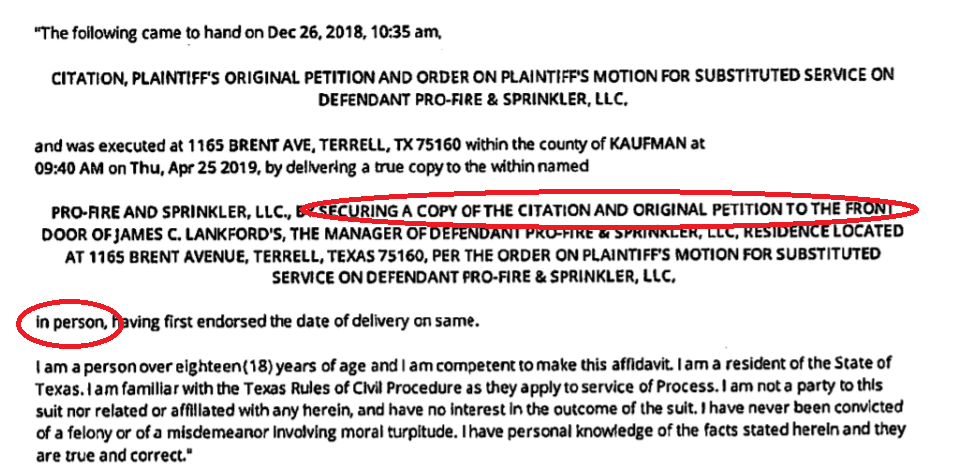 The panel majority concluded this return was defective because (1) the pleading was attached to the door without looking for someone over 16 to receive it, as required by the substituted-service order, and (2) the return was inconsistent, saying both that the pleading was attached to the door and served “in person.” A dissent saw these matters as the sort of “incidental details” that do not require reversal. No. 05-19-01490-CV (Nov. 29, 2021).
The panel majority concluded this return was defective because (1) the pleading was attached to the door without looking for someone over 16 to receive it, as required by the substituted-service order, and (2) the return was inconsistent, saying both that the pleading was attached to the door and served “in person.” A dissent saw these matters as the sort of “incidental details” that do not require reversal. No. 05-19-01490-CV (Nov. 29, 2021).
Reversing a Fifth Court opinion that had held otherwise, the Texas Supreme Court held: “A limited partnership’s agents for service of process are its general partner, Tex. Bus. Orgs. Code § 5.255(2), and its registered agent, id. § 5.201(b)(1). The evidence establishes that Miraki served only a WWLC employee described as its ‘owner,’ ‘president,’ and ‘CEO.’ Accordingly, we hold that WWLC demonstrated that it was not properly served.” WWLC v. Miraki, No. 20-0173 (June 18, 2021).
Service was inadequate to support a default judgment when: “The record before us shows the citation was addressed to ‘U.S. Bank Trust, N.A.’ However, the defendant in the action and the party against whom the default judgment was taken is ‘U.S. Bank Trust, N.A., as Trustee for LSF8 Master Participation Trust.’ There is no evidence in the record that service was had upon ‘U.S. Bank Trust, N.A., as Trustee for LSF8 Master Participation Trust.'” U.S. Bank Trust, N.A. v. AJ & Sal Enterprises, LLC, No. 05-20-00346-CV (April 30, 2021) (mem. op.).
 Singh v. Gill reminds of the importance of strict compliance with Tex. R. Civ. P. 106, the substituted-service rule:
Singh v. Gill reminds of the importance of strict compliance with Tex. R. Civ. P. 106, the substituted-service rule:
- Location. “Gill’s affidavit stated only that Gill did not know where Singh could be found. Her attorney’s affidavit recounted e-mail and telephone conversations with Singh in which he refused to provide his location. Neither affidavit, however, stated facts showing that service under rule 106(a) had been attempted. … “
- Attempts. “Moreover, the affidavits do not exhibit the diligence necessary to support substituted service. ‘A diligent search must include inquiries that someone who really wants to find the defendant would make, and diligence is measured not by the quantity of the search but by its quality.’ Here, there is no indication that Gill’s diligence included searching public data or ‘obvious inquiries’ a prudent investigator would have made,’ such as attempting service by mail to obtain a forwarding address or locating and contacting other persons who would likely have information about Singh, beyond Singh’s immediate family in India.”
No. 05-19-01146-CV (Jan. 20, 2021) (mem. op.).
In the 2018 election for a Dallas County Justice of the Peace position, Democratic candidate Margaret O’Brien obtained a default judgment that her Republican opponent, Ashley Hutcheson, was ineligible for the position because of her residence. IAfter the  election, in December 2018, a Fifth Court panel reversed, finding that the order was void because an Election Code provision bars default judgments in election cases, and further finding that the matter was not moot and required a further trial-court order because the judgment included an award of attorneys’ fees.
election, in December 2018, a Fifth Court panel reversed, finding that the order was void because an Election Code provision bars default judgments in election cases, and further finding that the matter was not moot and required a further trial-court order because the judgment included an award of attorneys’ fees.
Litigation continued before the en banc court (the makeup of which significantly changed in the same 2018 election), which ultimately settled. In a short opinion by Chief Justice Burns on March 6, 2020, a majority of the Court dismissed the case as moot and withdrew the panel opinion.
 Controversy ensued, as reflected by the four other opinions issued that day:
Controversy ensued, as reflected by the four other opinions issued that day:
- A dissent by Justice Schenck found that the matter was not moot (as it was capable
of repetition, etc.), agreed with the reasoning of the panel, and criticized the decision to withdraw the panel’s opinion (joined by Justices Bridges and Evans); - Another dissent, by Justice Whitehill, criticized the decision to withdraw the panel’s opinon for other reasons (also joined by Justice Bridges);
- A concurrence and dissent by Justice Bridges (the author of the panel opinion) agreed with the conclusion that the case is moot, disagreed with the withdrawal of the panel opinion, and reiterated the reasoning of that opinion (joined by Justices Myers, Whitehill, Schenck, and Evans — the full complement of Republican Justices on the present court);
- A concurrence by Justice Molberg clashed with the substantive reasoning of the dissents, but concluded that the order was void for another reason – ripeness – as the election had not yet occurred at the time of judgment. This opinion was joined by all other Democratic Justices on the court except Justice Pedersen, who did not participate in the case.
 PandaLand sought mandamus relief from the trial court’s grant of a new trial based on application of the Craddock factors. While mandamus jurisdiction has expanded for some types of new-trial grant, the Fifth Court denied relief here, stating: “Mandamus review of a trial court’s order granting a new trial is limited to orders that are void or set aside a jury verdict.” In re Pandaland Holding (HK) Ltd., No. 05-19-01259-CV (Jan. 17, 2020) (mem. op.).
PandaLand sought mandamus relief from the trial court’s grant of a new trial based on application of the Craddock factors. While mandamus jurisdiction has expanded for some types of new-trial grant, the Fifth Court denied relief here, stating: “Mandamus review of a trial court’s order granting a new trial is limited to orders that are void or set aside a jury verdict.” In re Pandaland Holding (HK) Ltd., No. 05-19-01259-CV (Jan. 17, 2020) (mem. op.).
Good news, Charles timely appealed the default judgment against her. “Charles filed her notice of appeal fourteen days after the trial court entered judgment.”
Bad news, nothing to appeal: “Because Charles did not file a motion for new trial, she did not introduce any evidence extrinsic to the record to support her satisfaction of any of the Craddock factors. Consequently, we hold that Charles has waived appellate review of her complaint that the trial court’s default judgment should be set aside.” Charles v. Crown Asset Management LLC, No. 05-18-01139-CV (Nov. 26, 2019) (mem. op.).
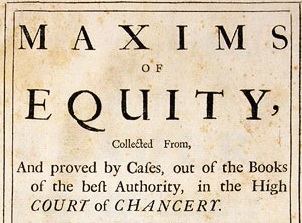 A bill of review is an equitable proceeding allowed by Texas law to challenge a default judgment. While equitable in nature, the proceeding still has serious proof requirements; in particular: “‘[T]he testimony of a bill of review plaintiff alone, without corroborating evidence, is insufficient to overcome the presumption that the plaintiff was served.’ Here, the evidence showed that . . . appellant was personally served . . . at 3815 N. Westmoreland at 7 p.m. on March 23, 2016. The officer’s return is prima facie evidence of the facts of service. Although appellant testified he was not served at that address, there was no other evidence to corroborate that statement. Although he admitted an unrecorded contract for deed showing a conveyance of the Westmoreland property to Alfredo Guzman in 2008, this document does not corroborate his testimony that he was not served at the location.” Mitchell v. City of Dallas, No. 05-18-01208-CV (Nov. 20, 2019) (unpubl.) (citations omitted, emphasis added).
A bill of review is an equitable proceeding allowed by Texas law to challenge a default judgment. While equitable in nature, the proceeding still has serious proof requirements; in particular: “‘[T]he testimony of a bill of review plaintiff alone, without corroborating evidence, is insufficient to overcome the presumption that the plaintiff was served.’ Here, the evidence showed that . . . appellant was personally served . . . at 3815 N. Westmoreland at 7 p.m. on March 23, 2016. The officer’s return is prima facie evidence of the facts of service. Although appellant testified he was not served at that address, there was no other evidence to corroborate that statement. Although he admitted an unrecorded contract for deed showing a conveyance of the Westmoreland property to Alfredo Guzman in 2008, this document does not corroborate his testimony that he was not served at the location.” Mitchell v. City of Dallas, No. 05-18-01208-CV (Nov. 20, 2019) (unpubl.) (citations omitted, emphasis added).
 “[Appellant]’s motion asserted that [he] was ‘unsophisticated in legal matters’ and did not understand he was required to file an answer and thought he would receive a hearing notice before any judgment was rendered. Not understanding a citation and then doing nothing after being served does not constitute a mistake of law that is sufficient to meet the first Craddock element.” Chapple v. Hall, No. 05-18-01209-CV (June 14, 2019) (mem. op.)
“[Appellant]’s motion asserted that [he] was ‘unsophisticated in legal matters’ and did not understand he was required to file an answer and thought he would receive a hearing notice before any judgment was rendered. Not understanding a citation and then doing nothing after being served does not constitute a mistake of law that is sufficient to meet the first Craddock element.” Chapple v. Hall, No. 05-18-01209-CV (June 14, 2019) (mem. op.)
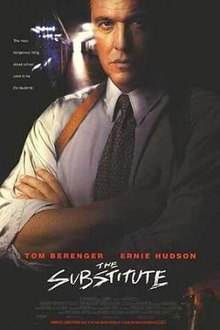 Daigrepont v. Preuss reversed a default judgment for failure to comply with an order authorizing substituted service under Tex. R. Civ. P. 106(b).
Daigrepont v. Preuss reversed a default judgment for failure to comply with an order authorizing substituted service under Tex. R. Civ. P. 106(b).
- “The trial court’s order required ‘the Citation, First Amended Petition, initial discovery requests, and this Order’ be left with a person over the age of 16 or by leaving the documents on the front door of Daigrepont’s residence. It further required ‘a copy of the Citation, Petition, initial discovery requests, and this Order’ be mailed by certified mail, return receipt requested and by regular mail.”
- However: “The return of service affidavits indicate the process server posted the citation, plaintiff’s original petition, civil case information sheet, and order granting plaintiff’s motion for substitute service to his front door and mailed the
aforementioned documents per the court’s order.”
“By failing to strictly follow the order, Preuss violated rule 106(b). Violation of rule 106(b) makes service of process invalid and of no effect.” No. 05-18-01271-CV (May 17, 2019) (mem. op.)
 Silverado’s answer was stricken because, as an LLC, it could not proceed pro se. A default judgment resulted and Silverado affirmed. Among other holdings, as to Silverado’s challenges to the damages evidence, the Fifth Court held: “An objection that an affidavit in support of a motion
Silverado’s answer was stricken because, as an LLC, it could not proceed pro se. A default judgment resulted and Silverado affirmed. Among other holdings, as to Silverado’s challenges to the damages evidence, the Fifth Court held: “An objection that an affidavit in support of a motion  for summary judgment contains hearsay is an objection to the form of the affidavit. To preserve this complaint for appellate review, Silverado was required to make the objection in the trial court and obtain a ruling from the trial judge. Because it did not retain counsel or otherwise appear as ordered, Silverado obviously did not make a hearsay objection in the trial court and, therefore, has waived its complaint on appeal.” Silverado Truck & Diesel Repair LLC v. Lawson, No. 05-18-00540-CV (April 3, 2019) (mem. op.) (citations omitted).
for summary judgment contains hearsay is an objection to the form of the affidavit. To preserve this complaint for appellate review, Silverado was required to make the objection in the trial court and obtain a ruling from the trial judge. Because it did not retain counsel or otherwise appear as ordered, Silverado obviously did not make a hearsay objection in the trial court and, therefore, has waived its complaint on appeal.” Silverado Truck & Diesel Repair LLC v. Lawson, No. 05-18-00540-CV (April 3, 2019) (mem. op.) (citations omitted).
 A default judgment was set aside in a restricted appeal because the plaintiff’s pleading did not establish that the debt at issue was unliquidated when the proof was conclusory:
A default judgment was set aside in a restricted appeal because the plaintiff’s pleading did not establish that the debt at issue was unliquidated when the proof was conclusory:
RGD’s amended petition states, with respect to its sworn account claim, that a contract to purchase products was entered into by the parties, RGD thereafter provided goods to MG, and “all of the goods were not paid for.” RGD then cites to Exhibit “A” as a systematic record of “an account covering certain products sold by [RGD to MG].” Exhibit “A” contains a single page with several entries, none of which clearly identifies the items constituting the account. Nor does Exhibit “A” indicate that the amounts listed thereon are unpaid. The accompanying “Sworn Account Affidavit,” signed by RGD’s credit manager, merely proves up Exhibit “A” as a business record and, without more, avers in conclusory fashion that GM owes RGD “$17,131.23 plus interest.” Neither a contract nor invoices are attached.
MG Int’l Menswear v. Robert Graham Designs, No. 05-18-00517-CV (Feb. 15, 2019) (mem. op.).
 The Fifth Court reversed the denial of Gattenby’s motion for new trial after a default judgment by a bank, finding that he raised a meritorious defense (the other two Craddock factors not being at issue: “[T]he record before us does not include evidence of an assignment between these two financial institutions. Rather, the Bank supported its claim for damages with a billing statement from a bank not party to this suit. To the extent the Bank contends ownership is established because the last four digits of theaccount listed in its original petition is identical to the last four digits of the account listed on Town North Bank’s billing statement attached to the Bank’s motion for default judgment, we reject its argument. Separate documents containing the same last four digits of an account is not evidence of an assignment” Gattenby v. TIB, No. 05-18-00168-CV (Feb. 6, 2019).
The Fifth Court reversed the denial of Gattenby’s motion for new trial after a default judgment by a bank, finding that he raised a meritorious defense (the other two Craddock factors not being at issue: “[T]he record before us does not include evidence of an assignment between these two financial institutions. Rather, the Bank supported its claim for damages with a billing statement from a bank not party to this suit. To the extent the Bank contends ownership is established because the last four digits of theaccount listed in its original petition is identical to the last four digits of the account listed on Town North Bank’s billing statement attached to the Bank’s motion for default judgment, we reject its argument. Separate documents containing the same last four digits of an account is not evidence of an assignment” Gattenby v. TIB, No. 05-18-00168-CV (Feb. 6, 2019).
The restricted appeal case of Cate v. Posey reminds:
- A difference in addresses noted in the record may not be material if the record also accurately establishes personal service; and
- A CPRC § 18.001 affidavit of reasonableness can be sufficient evidence to support the damages portion of a default judgment, but not if a referenced itemized list is not included in the record.
No. 05-17-01216-CV (Dec. 4, 2018) (mem. op.)
 A motion for new trial about a default judgment based on the three Craddock factors often spends most of its time on the first (mistake or accident) and second (meritorious defense) factors. But Craddock has three factors, and the third factor is both straightforward to satisfy and problematic if overlooked:
A motion for new trial about a default judgment based on the three Craddock factors often spends most of its time on the first (mistake or accident) and second (meritorious defense) factors. But Craddock has three factors, and the third factor is both straightforward to satisfy and problematic if overlooked:
“To meet the third element of Craddock, all Thompson had to do was allege in her motion for new trial that granting a new trial would not injure appellee. She could have met this requirement by offering in the motion for new trial to pay appellee’s attorney’s fees and expenses for obtaining the judgment. Had she done so, the burden of showing harm would have shifted to appellee to show injury. In this case, neither the motion to reinstate nor the motion for new trial asserted that granting a new trial would not injure appellee. Nor did the motions offer to pay appellee’s attorney’s fees and expenses for obtaining the judgment.”
Thompson v. Dallas City Attorney’s Office, No. 05-17-00847-CV (Oct. 18, 2018) (mem. op.)
 In a bad week for default judgments, the Fifth Court ruled for the appellant in a restricted appeal when the record showed:
In a bad week for default judgments, the Fifth Court ruled for the appellant in a restricted appeal when the record showed:
- “The affidavit of [substituted] service filed in this case lacked an accompanying motion,”
- “The return of service in this case does not reference the court in which the case was filed, as is required by [Tex. R. Civ. P.] 107(b)(2),” and
- “[T]he petition and citation were not left with anyone over the age of sixteen nor were they mailed. Moreover, while the return reflects that the petition and citation were taped to the front door of the foregoing Fairview address, it does not show that this address was Campbell’s usual place of business. Nor is this missing information contained in the court’s order or elsewhere in the record.”
Campbel v. Bank of America, No. 05-17-01364-CV (Aug. 2, 2018) (mem. op.)
 The trial court dismissed a bill of review proceeding for failing to state a claim and the Fifth Court reversed: “Accepting appellant’s allegations as true, together with any inference reasonably drawn therefrom, we conclude the petition alleges a wrongful act by the judge and the opposing party’s attorney that occurred outside of the adversarial proceeding and affects how the judgment was procured. The alleged wrongful act was unmixed with any fault on the part of appellant. We conclude appellant’s allegations are sufficient to meet the second and third elements of a bill of review in the face of a motion to dismiss pursuant to [Tex. R. Civ. P.] 91a.” For similar reasons, the Court concluded that the petition alleged a sufficiently serious deprivation of the movants’ rights. Thomas v. 462 Thomas Family Properties LP, No. 05-16-01161-CV (Aug. 2, 2018).
The trial court dismissed a bill of review proceeding for failing to state a claim and the Fifth Court reversed: “Accepting appellant’s allegations as true, together with any inference reasonably drawn therefrom, we conclude the petition alleges a wrongful act by the judge and the opposing party’s attorney that occurred outside of the adversarial proceeding and affects how the judgment was procured. The alleged wrongful act was unmixed with any fault on the part of appellant. We conclude appellant’s allegations are sufficient to meet the second and third elements of a bill of review in the face of a motion to dismiss pursuant to [Tex. R. Civ. P.] 91a.” For similar reasons, the Court concluded that the petition alleged a sufficiently serious deprivation of the movants’ rights. Thomas v. 462 Thomas Family Properties LP, No. 05-16-01161-CV (Aug. 2, 2018).
 The “not consciously indifferent” element of the three-part Craddock test was satisfied when the defaulted party “provided an uncontroverted explanation for its failure to answer in its motion for new trial and attached supporting declaration. In the supporting declaration, Intras’s representative . . . testified that after learning of the instant lawsuit, he contacted the representative at Core 3, Christopher Bergen, to try to resolve the matter,” as follows:
The “not consciously indifferent” element of the three-part Craddock test was satisfied when the defaulted party “provided an uncontroverted explanation for its failure to answer in its motion for new trial and attached supporting declaration. In the supporting declaration, Intras’s representative . . . testified that after learning of the instant lawsuit, he contacted the representative at Core 3, Christopher Bergen, to try to resolve the matter,” as follows:
During those discussions, Christopher Bergen represented to me that Core 3 would continue to work only on trying to resolve our dispute until it appeared that further negotiations were no longer productive, and at that point would give Intras reasonable notice before proceeding with any actions in the lawsuit.
Core 3 did not provide any notice to me or anyone else at Intras that Core 3 intended to proceed with the lawsuit or file any motion for default judgment.
The Fifth Court held that this declaration “shows neither intent nor conscious indifference. At worst, it evinces mere negligence; there is nothing to indicate that Intras intentionally chose not to answer the suit.” Intras LLC v. Core 3 Technologies LLC, No. 05-17-00832-CV (July 12, 2018) (mem. op.)
 The third prong of the Craddock test for setting aside a default judgment – that the defendant “file the motion at a time when granting it will occasion no delay or otherwise work an injury to the plaintiff” – is commonly cited when awarding attorneys’ fees to the plaintiff. The plaintiff in In re: CGI Construction went a step further and also obtained a requirement that the defendant waive its contractual right to arbitrate. The Fifth Court conditionally granted mandamus relief, finding as a matter of law (in light of the strong policy favoring arbitration) that “the trial court may not condition the granting of a new trial and motion to set aside default judgment on waiver of contractual arbitration rights,” and that the plaintiff did not otherwise establish evidence of injury (a lost witness, etc.) if arbitration proceeded. No. 05-18-00320-CV (June 18, 2018) (mem. op.)
The third prong of the Craddock test for setting aside a default judgment – that the defendant “file the motion at a time when granting it will occasion no delay or otherwise work an injury to the plaintiff” – is commonly cited when awarding attorneys’ fees to the plaintiff. The plaintiff in In re: CGI Construction went a step further and also obtained a requirement that the defendant waive its contractual right to arbitrate. The Fifth Court conditionally granted mandamus relief, finding as a matter of law (in light of the strong policy favoring arbitration) that “the trial court may not condition the granting of a new trial and motion to set aside default judgment on waiver of contractual arbitration rights,” and that the plaintiff did not otherwise establish evidence of injury (a lost witness, etc.) if arbitration proceeded. No. 05-18-00320-CV (June 18, 2018) (mem. op.)
 Ms. Mandava served divorce papers on Mr. Chukkapalli in India using the Hague Convention. When Chukkapalli moved for a new trial in Texas, pointing out flaws in how he was served, Mandava countered by showing that he had actual notice of the Texas lawsuit – he had made a filing with an Indian family court that identified the Texas case and attached a document from the Texas case file. The Fifth Court agreed with him about the problems with service and held: “Although it appears Chukkapalli had actual notice of the Texas divorce proceeding, actual notice to a defendant of a pending suit, without proper [service], is not sufficient.” However: “[U]pon remand, the parties will be before the court wihout need for further citation because Chukkapalli has now become subject to the jurisdiction of the court.” Chukkapalli v. Mandava, No. 05-15-01287-CV (June 30, 2017) (mem. op.)
Ms. Mandava served divorce papers on Mr. Chukkapalli in India using the Hague Convention. When Chukkapalli moved for a new trial in Texas, pointing out flaws in how he was served, Mandava countered by showing that he had actual notice of the Texas lawsuit – he had made a filing with an Indian family court that identified the Texas case and attached a document from the Texas case file. The Fifth Court agreed with him about the problems with service and held: “Although it appears Chukkapalli had actual notice of the Texas divorce proceeding, actual notice to a defendant of a pending suit, without proper [service], is not sufficient.” However: “[U]pon remand, the parties will be before the court wihout need for further citation because Chukkapalli has now become subject to the jurisdiction of the court.” Chukkapalli v. Mandava, No. 05-15-01287-CV (June 30, 2017) (mem. op.)
Defendants sought review of a post-answer default judgment by restricted appeal. Unfortunately for them, “the record is silent regarding whether notice of the final hearing date was sent . . . . ” They thus failed to show error on the face of the record, as required in a restricted appeal, because “absence in the record of any proof that notice . . . was sent to a party is ‘just that–an absence of proof of error.” Odela Group LLC v. Double-R Walnut Management LLC, No. 05-16-00206-CV (April 12, 2017) (mem. op.) (applying and quoting Gold v. Gold, 145 S.W.3d 212 (Tex. 2004)).
 If Dr. McCoy made his famous pronouncement, not as to an Enterprise crew member in a red shirt, but during litigation about another defendant by filing a “suggestion of death,” would he make a general appearance in that litigation? The Fifth Court answered “no” in Hegwer v. Edwards, primarily citing a line of cases holding that making and filing a Rule 11 agreement does not amount to a general appearance. No. 05-15-01464-CV (March 22, 2017).
If Dr. McCoy made his famous pronouncement, not as to an Enterprise crew member in a red shirt, but during litigation about another defendant by filing a “suggestion of death,” would he make a general appearance in that litigation? The Fifth Court answered “no” in Hegwer v. Edwards, primarily citing a line of cases holding that making and filing a Rule 11 agreement does not amount to a general appearance. No. 05-15-01464-CV (March 22, 2017).
 Echoing Justice Marshall’s classic head fake in Marbury v. Madison about jurisdiction, the case of In re Ralston Outdoor Advertising Ltd. offered a similar maneuver about Texas mandamus standards. After first expanding the Fifth Court’s usual citation to In re: Prudential Ins. Co., 148 S.W.3d 124 (Tex. 2004) to include its discussion of balancing (“An appellate remedy is ‘adequate’ when any benefits to mandamus review are outweighed by the detriments.”), the Court then denied mandamus relief based on longstanding pre-Prudential precedent : “Texas courts have long held that a plaintiff denied a default judgment has an adequate appellate remedy.” (citing Jackson v. McKinsey, 12 S.W.2d 1044, 1045 (Tex. Civ. App.—Fort Worth 1928, no writ)).
Echoing Justice Marshall’s classic head fake in Marbury v. Madison about jurisdiction, the case of In re Ralston Outdoor Advertising Ltd. offered a similar maneuver about Texas mandamus standards. After first expanding the Fifth Court’s usual citation to In re: Prudential Ins. Co., 148 S.W.3d 124 (Tex. 2004) to include its discussion of balancing (“An appellate remedy is ‘adequate’ when any benefits to mandamus review are outweighed by the detriments.”), the Court then denied mandamus relief based on longstanding pre-Prudential precedent : “Texas courts have long held that a plaintiff denied a default judgment has an adequate appellate remedy.” (citing Jackson v. McKinsey, 12 S.W.2d 1044, 1045 (Tex. Civ. App.—Fort Worth 1928, no writ)).
 A business involved in the fuel purchases of a convenience store (right) obtained a $344,000 default judgment against an individual involved with the store’s operations. The Fifth Court set aside the judgment under the Craddock factors. As to the first factor (conscious indifference), the Court reminded of the importance of evidence rulings: “Although Quik-Way objected to the affidavits and other evidence filed in support of the motion for new trial, it did not secure any rulings on its objections; thus, we consider all the evidence in support of the motion for new trial” On the merits, the defendant “explained that her sister . . . handled the financial and personnel matters in the business and was the day manager of the store. After they were sued, [the sister] said she would handle the lawsuit. According to [the defendant], [the sister] was more educated and did not have a full-time outside job. [The defendant] said she relied on her sister and believed a lawyer had been hired and that an answer had been filed.” The sister filed a confirming affidavit. This showing sufficed: “A party’s belief that she had taken the appropriate steps to hire counsel is not consciously indifferent conduct, nor does it show [the defendant] knew she was being sued but did not care.” Khwaja v. Quik-Way Retail Associates II, Ltd., No. 05-14-01090-CV (Dec. 28, 2015) (mem. op.)
A business involved in the fuel purchases of a convenience store (right) obtained a $344,000 default judgment against an individual involved with the store’s operations. The Fifth Court set aside the judgment under the Craddock factors. As to the first factor (conscious indifference), the Court reminded of the importance of evidence rulings: “Although Quik-Way objected to the affidavits and other evidence filed in support of the motion for new trial, it did not secure any rulings on its objections; thus, we consider all the evidence in support of the motion for new trial” On the merits, the defendant “explained that her sister . . . handled the financial and personnel matters in the business and was the day manager of the store. After they were sued, [the sister] said she would handle the lawsuit. According to [the defendant], [the sister] was more educated and did not have a full-time outside job. [The defendant] said she relied on her sister and believed a lawyer had been hired and that an answer had been filed.” The sister filed a confirming affidavit. This showing sufficed: “A party’s belief that she had taken the appropriate steps to hire counsel is not consciously indifferent conduct, nor does it show [the defendant] knew she was being sued but did not care.” Khwaja v. Quik-Way Retail Associates II, Ltd., No. 05-14-01090-CV (Dec. 28, 2015) (mem. op.)
Sylvester Davis sued TexPro Construction Group after the contractor failed to complete a backyard construction project. When TexPro failed to file an answer, Davis sought and obtained a partial default judgment on liability. TexPro then answered, but Davis moved forward with a hearing to establish damages. TexPro did not appear at the hearing, and the trial court awarded judgment for $117,230 in compensatory damages, treble damages under the DTPA and $350,000 in exemplary damages. After blowing through the deadlines for an ordinary appeal, TexPro hired new counsel and filed a restricted appeal. The Court of Appeals held that there was no error on the face of the record just because TexPro’s registered agent had been served at a location different from the address listed on the citation. The Court also held that there was no error in the trial court’s decision to move forward with the damages hearing, since the filing of TexPro’s answer did not negate the previously-signed default judgment on liability. However, Davis’ testimony on damages was the full amount of the money paid to TexPro, without accounting for the value of the work that TexPro had actually performed. Because his affidavit testimony was conclusory in alleging that the work done was valueless, the Court of Appeals reversed and remanded for a new trial on damages.
TexPro Constr. Group, LLC v. Davis, No. 05-14-00050-CV
A memorandum opinion setting aside a default judgment highlights one of the more forgiving standards for obtaining a new trial. FelCor/CSS Holdings sued Culinaire of Florida for failing to indemnify it in two personal injury suits. Culinaire received a courtesy copy of the lawsuit and put its insurer on notice. The insurer in turn hired defense counsel. But when the actual citation arrived, Culinaire’s CFO somehow forgot to forward it to the company’s insurance agent. Culinaire moved for a new trial under the familiar Craddock factors, but the trial court denied the motion. The Court of Appeals reversed and remanded, holding that losing paperwork is precisely the kind of “accident or mistake” that negates “conscious indifference” to the lawsuit.
Culinaire of Florida, Inc. v. FelCor/CSS Holdings, LP, No. 05-14-00832-CV
Under Rule 329b of the Texas Rules of Civil Procedure, the trial court loses its plenary power over a default judgment thirty days after it is signed. An exception to this 30 day rule is when a party fails to receive notice within 20 days of the signing of the judgment. In this case, the defendant sought to have a default judgment set aside, alleging that he did not receive notice of the judgment until the 98th day after it was rendered. The trial court granted his motion and vacated the default judgment.
The Court of Appeals, however, granted the defendant’s mandamus petition, because under Rule 306a(4), “a party who does not have actual knowledge of an order of dismissal within 90 days of the date it is signed cannot move for reinstatement.”
In a case involving a dispute among members of the Obowu Union DFW, the plaintiff sued the other members for defamation after he was suspended. The Union filed a plea in intervention but the plaintiff never filed an answer and the Union moved for default judgment, which the trial court granted. The case went to trial and a jury returned a verdict in the plaintiff’s favor on his defamation claim for over $200,000.
The defendants appealed the defamation verdict, which the Court of Appeals affirmed, and the plaintiff also appealed the default judgment. The Court affirmed the default judgment, rejecting the plaintiff’s argument that the trial court should have granted him a new trial because the intervenors failed to serve a copy of the motion for default judgment on him. Specifically, the Court noted that “after a defendant has been served with citation and the petition, the plaintiff has no legal duty to notify the defendant before taking a default judgment . . . .”
In this restricted appeal, the defendant argued that the trial court erred in entering a default judgment against it in the absence of evidence establishing mental anguish damages. Because the trial court received testimony of the plaintiffs physical injuries form a slip and fall, and no testimony on mental anguish, and because there was no way to distinguish between the award of mental anguish damages and those awarded for past physical pain, the judge’s award of $20,000 constitutes error on the face of the record.
In this breach of contract case, the defendant corporation filed an answer pro se. Because corporations must be represented by an attorney, the trial court entered an order giving the defendant notice that its pleading would be struck if it did not file a proper answer within 30 days. After it failed to do so, the plaintiffs moved to strike the pro se pleading and also filed a motion for default judgment. The trial court granted both motions, entering a default judgment in plaintiffs’ favor that included $78,000 in actual damages and over $10,000 in attorneys’ fees.
On appeal, the defendant argued that the trial court erred in striking its answer and entering a default judgment. The Court of Appeals rejected the defendant’s argument that the trial court’s action was overly harsh, but it agreed with the defendant that there was insufficient evidence in the record to enter the default judgment. The Court noted that, even if the facts in the plaintiffs’ petition were accepted as true, they had “failed to establish a breach of contract claim” against the defendant. Because the plaintiffs had not alleged sufficient facts to establish their claim, the Court set aside the default judgment and remanded the case back to the trial court.
GQ Enters. Corp. v. Rajani, No. 05-12-01353-CV
Speed Boats of Texas brought suit against Fountain Powerboats and obtained a default judgment. Fountain then filed a restricted appeal in which it sought to set aside the default judgment by arguing that the record did not establish that the secretary of state served Fountain with process. The Court of Appeals agreed. Because the record did not “affirmatively show that the secretary of state forwarded a copy of the process to the defendant,” the Court set aside the default judgment and remanded the case back to the trial court.
Fountain Powerboats v. Speed Boats of Texas, No. 05-13-006570-CV
Former NBA point guard Allen Iverson (aka “the answer“) was sued for breach of contract because he failed to show up to an all-star game party in Dallas at which he had allegedly agreed to make an appearance. Iverson filed a pro se answer asserting a general denial and various affirmative defenses, but failed to show up for trial. The trial court rendered a default judgment. On appeal, the Court made clear that, because Iverson had answered, the plaintiff had to prove each element of its claim. The Court then found that the plaintiff failed to establish the existence of a contract because it did not produce an actual written contract or provide any substantive testimony about the contract’s formation.
A pair of California residents sought to set aside a default judgment by means of a restricted appeal. The defendants claimed that the trial court lacked jurisdiction due to defective service of process, which had been accomplished through the Secretary of State. The Secretary of State’s certificate of service stated that process for both defendants had been “Unclaimed.” After the defendants failed to appear, the trial court entered default judgment for $612,500 in damages and another $13,258.27 in attorney fees. The Court of Appeals affirmed. Although the process server had listed the date of execution as taking place the month before he received the citation, that apparent typographical error was not enough to invalidate the return of service, particularly where the other service documents demonstrated the correct date of service. Substitute service through the Texas Secretary of State was also proper, the Court held, because the petition alleged that they were doing business in Texas by entering into a promissory note and guaranty with a Texas company, with the note also secured by real property located in Kaufman County. Nor did the “Unclaimed” notations demonstrate that the citations had not been served. Instead, the Court followed previous cases holding that it indicated only that the defendants had refused or failed to claim the citations from the Secretary of State’s mailings, not that service had not been accomplished.
Dole v. LSREF2 APEX 2, LLC, No. 05-12-01683-CV
Kelly Hawkins obtained a default judgment in his home state of Kansas against Texas attorney Lloyd Ward and his firms. Hawkins then brought suit in Dallas to enforce the Kansas judgment. Ward contended that the Kansas judgment was ineffective because that state lacked personal jurisdiction over him. The Court of Appeals disagreed. The Kansas court had found jurisdiction based in part on the allegation that the defendants had operated as a joint venture in entering into their representation of Hawkins, and Ward failed to negate that conclusion by clear and convincing evidence. Ward also failed to negate Hawkins’ allegations of the defendants’ contacts with Hawkins in Kansas during the course of the representation. The Court of Appeals therefore affirmed the trial court’s denial of Ward’s motion to vacate the Kansas judgment.
Ward v. Hawkins, No. 05-12-00712-CV
Karen Smith sued Brown Consulting & Associates, her employer, for injuries she sustained during the course of her employment. BCA never appeared, and the trial court entered default judgment in Smith’s favor. On appeal, BCA argued that Smith failed to properly serve it, and that the default judgment should be voided. The Court of Appeals agreed with BCA, finding that the affidavit Smith submitted in suport of her rule 106(b) motion for substitute service of process was defective for two reasons. First, the affidavit did not contain a statement that BCA’s address was the usual place of business of the defendant or its registered agent. Second, the affidavit did not contain a statement that the address is a place where the registered agent could probably be found. Because the Court strictly construes the rules governing service when a default judgment is entered, it reversed the trial court’s entry of default judgment and remanded the case for further proceedings.
HCBeck was hired to build a hall for a church. It subcontracted the foundation work to another company, B&R Development. After the building was completed, the hall began to have foundation problems, which cost HCBeck $68,976 to repair. HCBeck sued B&R for negligence and breach of contract, and obtained a no-answer default judgment. The company proved up the amount of its damages with an affidavit and supporting documentation, but the trial court did not hold an evidentiary hearing. On restricted appeal, the court of appeals reversed and remanded, holding that an evidentiary hearing was necessary because the damages sought by HCBeck were unliquidated. HCBeck’s affidavit was also inadequate to prove the claimed damages because the supporting documents totaled approximately $87,000, not the $68,976 that HCBeck sought for the default judgment. However, the court of appeals denied B&R’s request for a new trial on the merits because the company had never filed a motion for new trial in the district court. Accordingly, the remand was limited to the issue of HCBeck’s damages.
B&R Development , Inc. v. HCBeck, Ltd., No. 05-11-01150-CV
The court reversed and remanded a forcible-detainer and unpaid rent default judgment. The tenants moved from the landlord’s property prior to the action, which the landlord won in the justice court. The tenants appealed to the county court, but failed to appear for trial and court granted the landlord all of its requested relief. In a motion for new trial and attached affidavits, the tenants asserted that they received no notice of the trial setting. Despite the fact that the tenants had included the new, correct address in their pleading, the court sent their notice to their old address at the landlord’s apartment complex. The tenants failed to set a hearing on the motion, however, which was then overruled by operation of law.
On appeal, the court held that the tenants established lack of notice of the trial setting, and thus that the default judgment on the landlord’s action for unpaid rent and attorney’s fees should be set aside and the case remanded for trial. The court also held that the landlord’s forcible-detainer action was moot because possession was already relinquished.
The court affirmed a summary judgment reviving a default judgment entered against Bartz in 1989. Randall brought this action to revive it in 2010, providing affidavit evidence purportedly showing that she procured a writ of execution to be served on Bartz at his last known address in 1999, thereby extending the time to revive and enforce the judgment until 2011. The court granted Randall’s motion for summary judgment, reviving the default judgment.
On appeal, Bartz argued that Randall failed to show that her revival action was timely. The court noted that Randall had the burden to show that a writ was prepared and issued by the court clerk and delivered to the proper officer for execution within the 10-year statutory time period. The evidence showed that Randall had a writ issued just inside of 10 years after the judgment and that the judgment thus became dormant in 2009, ten years after the writ issued. Randall’s action to revive the judgment was then filed less than two years after the judgment became dormant, so the action was timely. Finally, when the writ was returned due to a bad address Bartz supplied, Randall had no obligation under the statute extending the life of the judgment to ensure actual service.
On the eve of trial, the district court granted a motion to withdraw filed by the attorneys for L’Arte de la Mode, Inc., but denied the company’s request for a continuance because it was the client’s fault they had not been paying their bills. The case was called to trial, but nobody appeared for L’Arte. The trial court therefore granted a default judgment for Neiman Marcus, awarding it more than $150,000 in compensatory damages and twice that amount for exemplary damages, all attributable to Neiman’s claim for money had and received. L’Arte retained substitute counsel, but the trial court denied the company’s motion for new trial. The court of appeals reversed, holding that L’Arte had established all of the elements for a new trial.
The court of appeals analyzed the case under the venerable standards of Craddock v. Sunshine Bus Lines, Inc., 133 S.W.2d 124 (Tex. 1939), which requires the movant to establish that (1) the failure to appear was not intentional or the result of conscious indifference, but was the result of an accident or mistake, (2) the movant has a meritorious defense, and (3) granting the motion will occasion no delay or otherwise injure the plaintiff. L’Arte established the first element through the affidavit of its in-house counsel, who stated that L’Arte had not received either the attorneys’ motion to withdraw or the order granting the withdrawal. L’Arte also established that it had a meritorious defense through its contention that Wells Fargo actually holds Neiman’s money, thanks to its factoring arrangement with L’Arte. Finally, the court of appeals held that L’Arte had satisfactorily assured that a new trial would not injure Neiman Marcus by agreeing to pay its attorney fees incurred in obtaining the default judgment, despite Neiman’s objection that the promise was hollow in light of L’Arte’s inability to pay its own attorneys and its failure to post a bond to supersede the existing judgment. The court of appeals therefore reversed the default and remanded to the district court for a trial on the merits.
L’Arte de la Mode, Inc. v. Neiman Marcus Group, No. 05-11-01440-CV
Few defendants are willing to take the risk of not answering a lawsuit when service of process has been defective. After all, moving to quash service in Texas only gets you additional time to file an answer (see TRCP 122), and there is always the chance that a default judgment will be sustained if the attack on service is unsuccessful. But whether by luck or design, Bailey’s Furniture, Inc. has reversed the trial court’s entry of default judgment by challenging the plaintiff’s attempted service of process. According to the process server’s affidavit, he had attempted to serve “Defendant Charles Bailey” on five occasions. But while the petition identified Charles Bailey as the registered agent of Bailey’s Furniture, nothing in the process server’s affidavit indicated that he was being served in that capacity, and he was not in fact the defendant named in the lawsuit. Because proper service had not been made prior to entry of the default judgment, the trial court never obtained personal jurisdiction over Bailey’s, rendering the judgment void. The court of appeals therefore reversed and remanded the case to the district court for further proceedings.
Bailey’s Furniture, Inc. v. Graham-Rutledge & Co., No. 05-11-00710-CV
